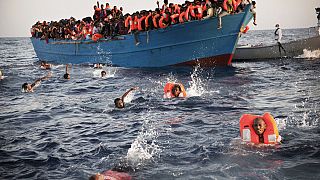African migrants
The UN Refugee Agency has warned in a new report that conflicts in Sudan and across the Sahel region have compromised protection for migrants crossing from sub-Saharan Africa.
For the hundreds of thousands of refugees and migrants attempting to cross from sub-Saharan African countries to Europe, the journey is an extremely dangerous one.
The migration routes are all the more dangerous due to the lack of critical services, the UNHCR has said.
“Our capacity to partner directly with local authorities is missing," said Vincent Cochetel, UNHCR Special Envoy for the Central Mediterranean Situation. "But the local authorities are there and they would be able to provide those immediate protection services.”
The UN report says that, despite the location of major migration hubs being known, there remains a lack of migrants' access to immediate assistance, shelter, or information about the dangers they may face
This absence of protection measures placed refugees and migrants “at great risk of harm and death” and also triggered dangerous secondary onward movements.
Dangers of desert crossings
As well as African migrants, those on the move come from Asia and the Middle East.
Many underestimate the risks and dangers and many die while crossing the desert or near borders, UNHCR said, noting that most also suffer serious human rights violations, including sexual violence, kidnappings, torture and physical abuse.
“Many don’t go to capital cities where humanitarian actors are based and well represented,” Cochetel told journalists in Geneva.
“They embark to secondary routes, reaching smaller cities in hard-to-reach areas” including in the Sahara Desert.
“This is where services should be located.”
With the right level of funding, supported services could provide immediate humanitarian assistance, shelter, referral mechanisms, information on the dangers involved in embarking on hazardous journeys, and access to justice.
Local authorities
Taking the example of Agadez in central Niger - a major migration hub towards Libya and where the security situation remains extremely dangerous for migrants - Cochetel emphasized that “the local authorities are present, people who were born there. Let's work with these authorities."
He pointed out that humanitarian actors are unable to work in some of these locations, "either because of safety concerns or because authorities don’t want humanitarian actors to be present."
According to the UNHCR, 108.4 million people worldwide are forcibly displaced. Most refugees - 76 percent - are hosted by low and middle-income countries.
In addition, the UN Migration Agency (IOM) reports more than 280 million international migrants worldwide - 3.6 percent of the global population.












01:24
EU to seek tougher measures from Libyan authorities on Mediterranean migrant sea crossings
01:22
World will have to learn to live with heatwaves, UN says
01:39
Sustainable development financing conference opens in Seville
01:49
Sudanese refugees in Chad face deepening humanitarian crisis
01:35
UN and Haitian officials mark one year since Kenyan police arrived to support security efforts
01:42
Gaza residents welcome rare organized aid delivery after months of chaos and hunger